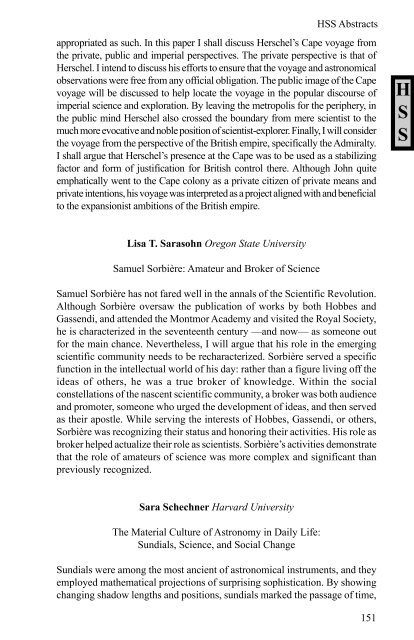2000 HSS/PSA Program 1 - History of Science Society
2000 HSS/PSA Program 1 - History of Science Society
2000 HSS/PSA Program 1 - History of Science Society
Create successful ePaper yourself
Turn your PDF publications into a flip-book with our unique Google optimized e-Paper software.
<strong>HSS</strong> Abstracts<br />
appropriated as such. In this paper I shall discuss Herschel’s Cape voyage from<br />
the private, public and imperial perspectives. The private perspective is that <strong>of</strong><br />
Herschel. I intend to discuss his efforts to ensure that the voyage and astronomical<br />
observations were free from any <strong>of</strong>ficial obligation. The public image <strong>of</strong> the Cape<br />
voyage will be discussed to help locate the voyage in the popular discourse <strong>of</strong><br />
imperial science and exploration. By leaving the metropolis for the periphery, in<br />
the public mind Herschel also crossed the boundary from mere scientist to the<br />
much more evocative and noble position <strong>of</strong> scientist-explorer. Finally, I will consider<br />
the voyage from the perspective <strong>of</strong> the British empire, specifically the Admiralty.<br />
I shall argue that Herschel’s presence at the Cape was to be used as a stabilizing<br />
factor and form <strong>of</strong> justification for British control there. Although John quite<br />
emphatically went to the Cape colony as a private citizen <strong>of</strong> private means and<br />
private intentions, his voyage was interpreted as a project aligned with and beneficial<br />
to the expansionist ambitions <strong>of</strong> the British empire.<br />
H<br />
S<br />
S<br />
Lisa␣ T. Sarasohn Oregon State University<br />
Samuel Sorbière: Amateur and Broker <strong>of</strong> <strong>Science</strong><br />
Samuel Sorbière has not fared well in the annals <strong>of</strong> the Scientific Revolution.<br />
Although Sorbière oversaw the publication <strong>of</strong> works by both Hobbes and<br />
Gassendi, and attended the Montmor Academy and visited the Royal <strong>Society</strong>,<br />
he is characterized in the seventeenth century —and now— as someone out<br />
for the main chance. Nevertheless, I will argue that his role in the emerging<br />
scientific community needs to be recharacterized. Sorbière served a specific<br />
function in the intellectual world <strong>of</strong> his day: rather than a figure living <strong>of</strong>f the<br />
ideas <strong>of</strong> others, he was a true broker <strong>of</strong> knowledge. Within the social<br />
constellations <strong>of</strong> the nascent scientific community, a broker was both audience<br />
and promoter, someone who urged the development <strong>of</strong> ideas, and then served<br />
as their apostle. While serving the interests <strong>of</strong> Hobbes, Gassendi, or others,<br />
Sorbière was recognizing their status and honoring their activities. His role as<br />
broker helped actualize their role as scientists. Sorbière’s activities demonstrate<br />
that the role <strong>of</strong> amateurs <strong>of</strong> science was more complex and significant than<br />
previously recognized.<br />
Sara Schechner Harvard University<br />
The Material Culture <strong>of</strong> Astronomy in Daily Life:<br />
Sundials, <strong>Science</strong>, and Social Change<br />
Sundials were among the most ancient <strong>of</strong> astronomical instruments, and they<br />
employed mathematical projections <strong>of</strong> surprising sophistication. By showing<br />
changing shadow lengths and positions, sundials marked the passage <strong>of</strong> time,<br />
151
















